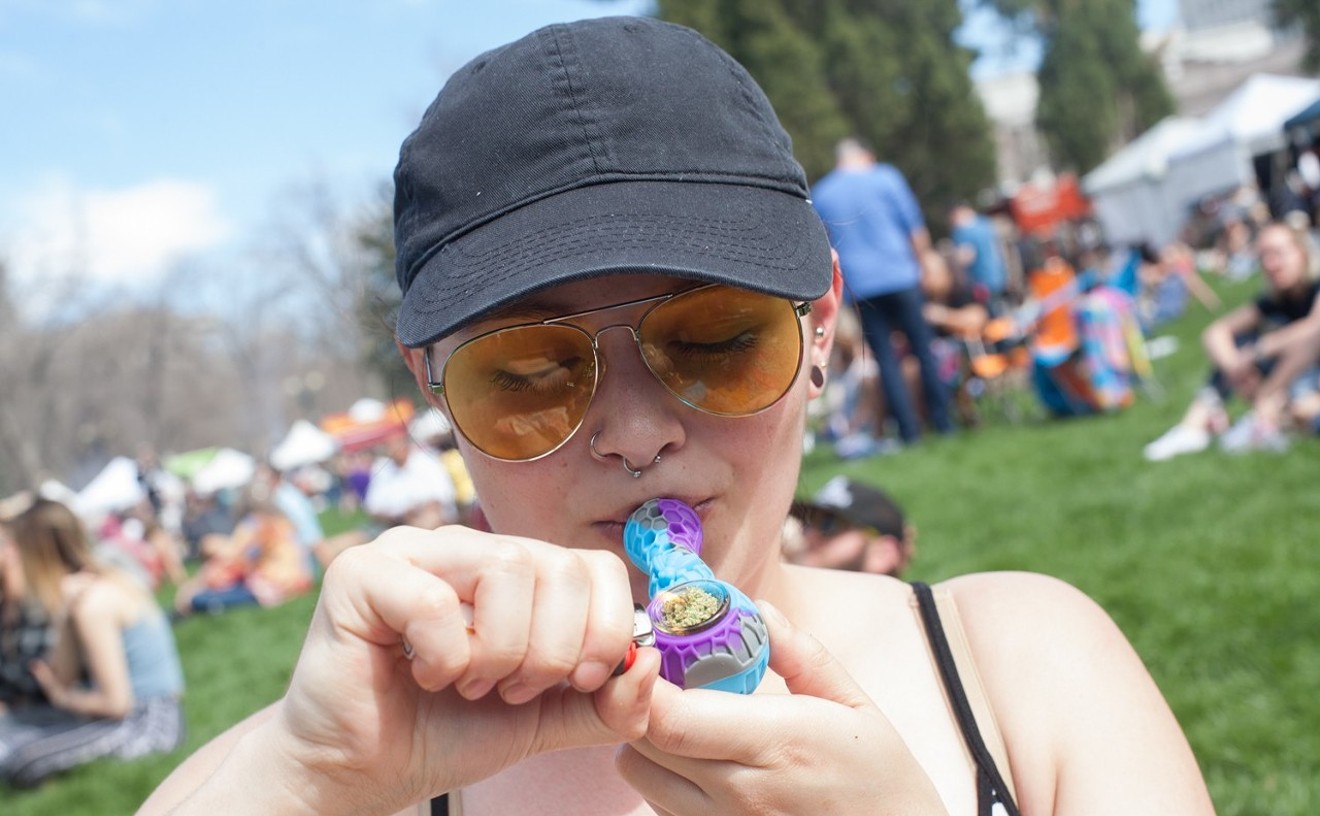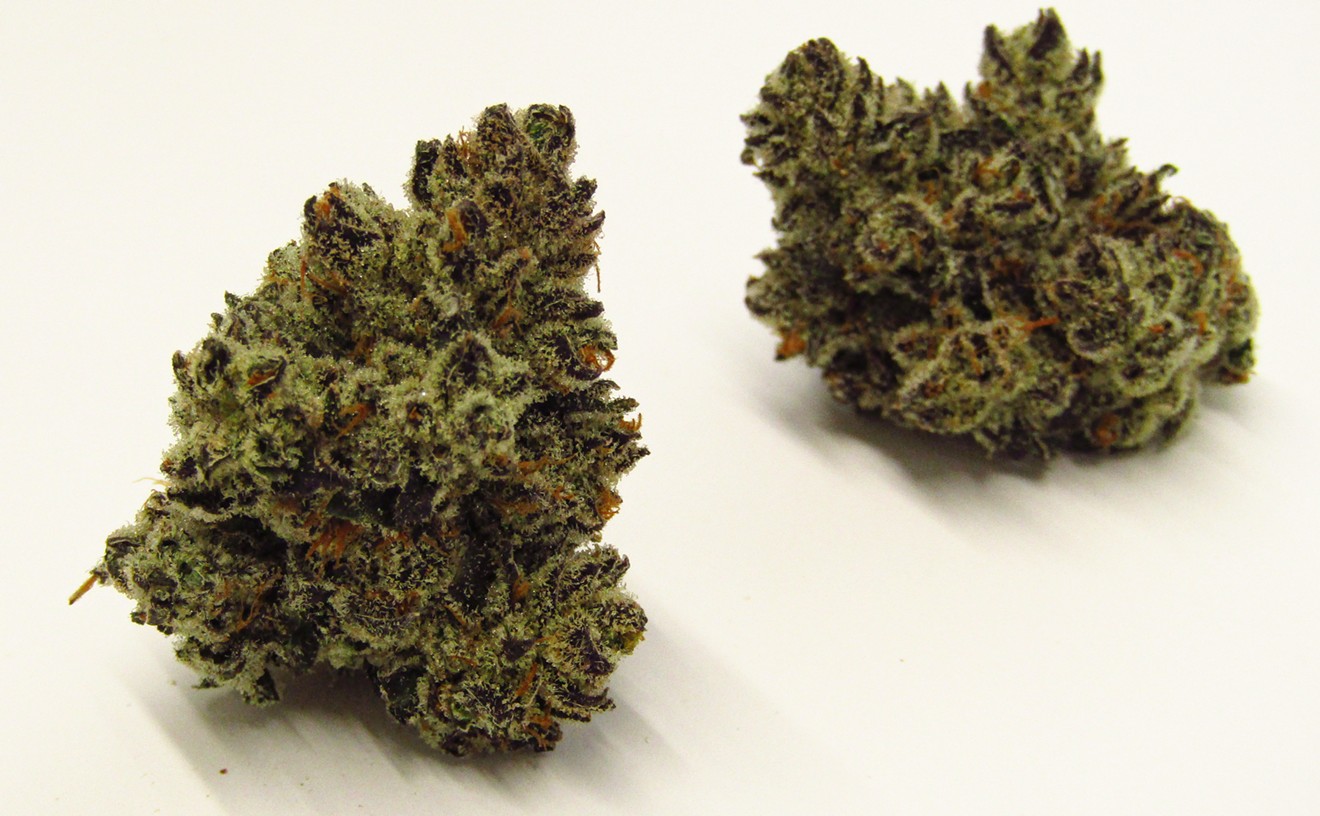Colorado marijuana officials have proposed a series of significant rule changes that would affect decontamination, advertising, tracking and hospitality regulations. But the suggestions are getting mixed reviews from the pot industry.
The Colorado Marijuana Enforcement Division has been meeting with stakeholders throughout the summer and fall as part of its annual rulemaking process, discussing everything from mandated legislative changes to increased business licensing fees to decontaminated weed warnings. During the MED's most recent public meeting on October 30, the last scheduled hearing before official rules will be adopted January 8, department officials presented a lengthy set of proposals, some of which were included for the first time.
Here are five highlights from the suggested rule changes:
Decontaminated weed symbol
Commercial marijuana is subject to testing for contaminants such as mold, pesticides and heavy metals in Colorado, but marijuana that fails testing is allowed to be decontaminated and then sold to consumers. To do this, growers can use everything from microwaves to X-ray and light irradiation, ozone machines and vaporized hydrogen peroxide. State officials have proposed that decontaminated products be labeled with a symbol or label noting that they failed testing and were decontaminated, with the rule set to take place in 2025 "to provide sufficient time for the development and implementation," according to MED deputy director Kyle Lambert. Some growers put their marijuana through similar processes before testing to ensure decontamination and lab approval; these products would not be labeled under the MED's proposed rules.
Prohibition on product claims
Included late in the MED's suggested rules was a small blurb related to health benefit claims. According to the newest draft, licensed marijuana businesses are banned from advertising a brand or company "that asserts its products are safe or that its products provide health and physical benefits." This could impact edibles that are marketed to help promote sleep, energy, appetite or focus, among other heath and wellness benefits.
The move mirrors a Food and Drug Administration approach banning marijuana and CBD brands from making any health or physical claims because of the plant's federal prohibition. Pot-industry representatives pushed back on the proposal for a variety of reasons, citing legal, scientific and ethical issues.
"Aside from the legality, it just doesn't make sense," Marijuana Industry Group executive director Bradley Truman said during the MED's October 30 hearing. "There are a lot of medical benefits to cannabis. This is widely acknowledged and has been proven many times over with best-in-class studies. The state's own documents published on CDPHE's website reference scientific studies and reference public health. ... Are we allowed to mention that? If not, why not?"
Bradley and other marijuana industry members said that forcing such a state-level restriction on marijuana would violate constitutional protections on commercial speech. However, MED policy director Allison Robinette argued that marijuana businesses can be subjected to such signage requirements, which "may include prohibiting advertising claims related to health benefits."
Event participation bans
Another late addition to the MED's rules: a proposed ban on licensed marijuana businesses from participating in unlicensed events, such as ticketed or money-oriented cannabis dinners and food pairings, movie screenings, art exhibitions and other events where pot consumption is allowed.
The MED's newly proposed event rules, added to other drafts released last month, would ban licensed marijuana brands from promoting, participating in or providing cannabis for "consumption activities that do not occur on the premises of a licensed hospitality business."
Only a handful of local governments allow licensed marijuana hospitality or events, however, with just five permitted venues and mobile lounges currently operating in Colorado, all of which are in the Denver area. According to marijuana business owners, these private functions make up most of the cannabis events in the state.
When the proposed rule was introduced at the meeting, it was met with universal pushback from industry representatives. According to marijuana attorney Rachael Ardanuy, advertising restrictions at the federal and state levels, as well as a lack of licensed event options, have created unfair marketing obstacles for marijuana brands.
"This addition is really a step in the wrong direction. It would really hurt licensees of all types and all brands. ... At this point in our state, nearly 100 percent of consumption takes place in private places or illegally in public," Ardanuy said during the hearing.
Marijuana lobbyist Samantha Walsh criticized the suggested rule's late introduction and warned of broad interpretations that could end up in enforcement action against brands and delivery services that produce or provide marijuana for private parties in Colorado. In response, MED officials reminded those at the meeting that the rules were only proposed, and that "what you see today may or may not be adopted by the state licenses authority."
Higher cannabis bar purchase limits
Until the MED's proposed policy on unlicensed events and activity, the majority of rulemaking discussion around hospitality has centered on increasing the sales limits at marijuana bars and venues with micro sales licenses.
Cannabis hospitality businesses currently fall into two tiers in Colorado: lounges operating under a bring-your-own model and establishments allowing sales. That second category has regulations similar to those at bars, with visitors ages 21 and up allowed to buy up to two grams of cannabis flower, 0.5 grams of hash, or an edible with ten milligrams of THC, with all product required to be consumed or thrown away on site before the customer leaves.
There are three businesses licensed for hospitality and micro-sales in Colorado. Only one, JAD's Mile High Smoke in unincorporated Adams County, is currently operating. The other two venues, a lounge on East Colfax Avenue and a spa and outdoor patio space in south Denver, haven't yet announced opening dates.
After going back and forth with industry representatives and youth-use prevention groups, the MED is suggesting that hospitality businesses now be allowed to sell up to one ounce of flower, eight grams of concentrates or edibles containing 100 milligrams of THC, amounts similar to Colorado's daily sales limits at recreational dispensaries.
Potential new tracking system
Under contract with the State of Colorado since recreational sales began, METRC could be in danger of losing its status as the tracking system for all licensed marijuana production. METRC is widely used across states with commercial pot, and first debuted in Colorado, with tags and tracking numbers involved in every step of its seed-to-sale system. However, METRC's wide and forced use across the country has created plenty of critics of the seed-to-sale system, which requires that every plant have a tag at the base for tracking. With each plant costing up to 75 cents to track, growers have long complained of the money and waste involved.
Over the last several months, the MED has considered a harvest batch tracking system for plants that would require less tracking material, but department director Dominique Mendiola says that such a move needs an amendment to the state's contract with METRC — and, more important, would need METRC's approval. Neither can be accomplished during this rulemaking session, she said during the hearing; in the meantime, the MED has decided to open up the state to potential new tracking suitors. Although Mendiola said that the data, local production information and market studies enabled by METRC have been "extremely beneficial" to Colorado and didn't rule out renewing the partnership, she added that the state is going to hear out "open and competitive solicitation on inventory tracking" as METRC's contract expires in the 2025 fiscal year.
[
{
"name": "Air - MediumRectangle - Inline Content - Mobile Display Size",
"component": "12017618",
"insertPoint": "2",
"requiredCountToDisplay": "2",
"watchElement": ".fdn-content-body",
"astAdList": [
{
"adType": "rectangle",
"displayTargets": "mobile"
}
]
},{
"name": "Editor Picks",
"component": "17242653",
"insertPoint": "4",
"requiredCountToDisplay": "1",
"watchElement": ".fdn-content-body",
"astAdList": [
{
"adType": "rectangle",
"displayTargets": "desktop|tablet"
},{
"adType": "rectangle",
"displayTargets": "desktop|tablet|mobile"
}
]
},{
"name": "Inline Links",
"component": "18838239",
"insertPoint": "8th",
"startingPoint": 8,
"requiredCountToDisplay": "7",
"maxInsertions": 25
},{
"name": "Air - MediumRectangle - Combo - Inline Content",
"component": "17261320",
"insertPoint": "8th",
"startingPoint": 8,
"requiredCountToDisplay": "7",
"maxInsertions": 25,
"watchElement": ".fdn-content-body",
"astAdList": [
{
"adType": "rectangle",
"displayTargets": "desktop|tablet"
},{
"adType": "rectangle",
"displayTargets": "desktop|tablet|mobile"
}
]
},{
"name": "Inline Links",
"component": "18838239",
"insertPoint": "8th",
"startingPoint": 12,
"requiredCountToDisplay": "11",
"maxInsertions": 25
},{
"name": "Air - Leaderboard Tower - Combo - Inline Content",
"component": "17261321",
"insertPoint": "8th",
"startingPoint": 12,
"requiredCountToDisplay": "11",
"maxInsertions": 25,
"watchElement": ".fdn-content-body",
"astAdList": [
{
"adType": "leaderboardInlineContent",
"displayTargets": "desktop|tablet"
},{
"adType": "tower",
"displayTargets": "mobile"
}
]
}
]












